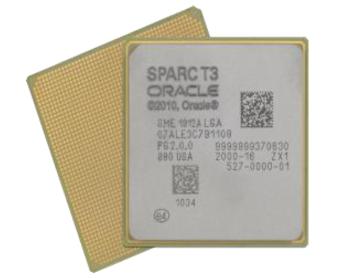Oracle will reduce the number of cores in SPARC T4 processors
 The next generation of SPARC T4 server processors will be with eight cores instead of 16 in the current SPARC T3. This decision was made by Oracle, which now owns the microprocessor division of Sun.
The next generation of SPARC T4 server processors will be with eight cores instead of 16 in the current SPARC T3. This decision was made by Oracle, which now owns the microprocessor division of Sun.SPARC T3 after its appearance in September 2010 became the first server processor with 16 cores. A large number of threads are better suited for processing web requests and other easily parallelizable tasks, and not for the ERP systems that Oracle specializes in. Therefore, it was decided that in SPARC T4 (expected in 2011) the number of cores will be reduced in order to improve the performance of each individual thread.
A hint at a reduction in the number of cores was heard during the presentation of the Sparc Supercluster last week. One of the presentation slides included information on plans for SPARC T4. Later information about the return to the eight cores was confirmed.
Larry Ellison said that in SPARC T4, individual thread performance will be tripled, so even 8-core processors in Oracle servers will be much more efficient than SPARC T3.
')
At the same time, Sun (before the takeover of Oracle) always positioned SPARC T3, which was then called UltraSPARC T3, as a processor for “network” tasks. However, Oracle has canceled such positioning and describes it as a “general purpose processor”, and the Sparc Supercluster introduced last week - as a “general purpose computer” (general purpose computer).
Sparc Supercluster even managed to overtake IBM in the official list of the most productive clusters according to TPC-C with an index of 30 million transactions per minute, although Oracle methods were criticized by IBM. They believe that "the integration of 27 systems is an extremely inefficient approach that is impractical in the real world, and is caused only by the desire to win the test."
In addition to Sun chips, Oracle also uses Sparc64 VII + processors (3 GHz, 12 MB cache) manufactured by Fujitsu in its M-series servers. This is another implementation of the same Sparc v9 architecture, and here you can clearly see the “sharpening” under single-track performance.
According to some analysts, in the future, Oracle wants to standardize processors and use only one implementation.
Source: https://habr.com/ru/post/109628/
All Articles